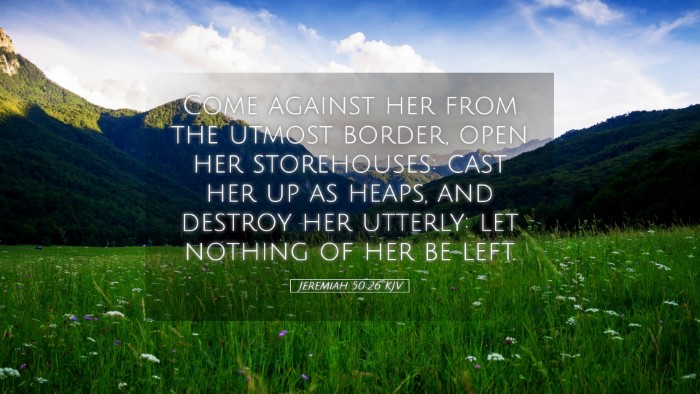Commentary on Jeremiah 50:26
Jeremiah 50:26 states: "Come against her from the farthest border; open her storehouses: cast her up as heaps, and destroy her utterly: let nothing of her be left." This verse is a part of the prophecy against Babylon, which represents both a literal and symbolic message within the broader context of Scripture. The insights drawn from public domain commentaries by Matthew Henry, Albert Barnes, and Adam Clarke provide a rich understanding of the implications of this passage.
The Context of Jeremiah 50
This chapter occurs within a larger prophetic narrative concerning the impending judgment of Babylon, a dominant empire known for its oppression of Israel and its idolatry. The specific context of Jeremiah 50 reveals a divine mandate for the total destruction of Babylon as a means of divine justice.
Exegetical Insights
- Matthew Henry's Commentary:
Henry emphasizes that Babylon represents not just a physical location but also a spiritual condition—one of pride and rebellion against God. He interprets the call to "open her storehouses" as a command to reveal the hidden treasures of Babylon, which are to be pillaged as a demonstration of divine judgment. This highlights God’s sovereignty in dismantling worldly power and wealth.
- Albert Barnes' Notes:
Barnes notes that the phrase "cast her up as heaps" indicates the total devastation that God plans to enact on Babylon. He reminds readers that this destruction is both a literal and prophetic fulfillment of God's covenant promise to protect His people. Barnes underscores the notion that God's judgment serves dual purposes: the punishment of the wicked and the preservation of His faithful remnant.
- Adam Clarke's Commentary:
Clarke provides a detailed analysis of the language used in this verse, particularly the term "destroy her utterly." He interprets this as an indication of the complete removal of Babylon's influence and the establishment of a new order under God's reign. Clarke also connects this prophecy to God's broader salvific plan, emphasizing that Babylon's fall symbolizes the eventual triumph of God's kingdom over worldly powers.
Theological Reflections
The judgments pronounced upon Babylon resonate with major theological themes throughout Scripture, such as sin, judgment, and redemption. The complete destruction of Babylon serves as a foreshadowing of the final judgment that will be enacted at the end of the age. This concept is central to understanding God’s character as both just and merciful.
For pastors and theologians, this verse is a reminder of the temporal nature of earthly kingdoms. It challenges congregations to reflect on their own lives and the systems of power that may lead them away from God. Just as Babylon was called to account for its sins, believers today are called to examine their lives in light of divine holiness and truth.
Practical Applications
- For Pastors:
Pastors can draw upon Jeremiah 50:26 when discussing themes of accountability and repentance within the church. The call for external judgment can serve as a cautionary tale encouraging congregations to seek righteousness and justice, both individually and corporately.
- For Students and Theologians:
Students of theology may find value in the comparative analysis of this text with other prophetic literature. Reflecting upon the imagery of destruction can foster deeper discussions regarding eschatology and the nature of divine justice. Emphasizing the historical context enhances understanding of the implications of this prophecy.
Conclusion
In summary, Jeremiah 50:26 provides profound insights into the nature of God's judgment against Babylon, serving both as a historical warning and a theological reflection for today. By studying commentaries from respected theologians, we can glean valuable lessons on the nature of sin, the assurance of God's justice, and the hope we possess as partake in His kingdom. The total destruction of Babylon draws us into a deeper understanding of the power of God to accomplish His will, reminding all believers of the ultimate triumph of good over evil.


